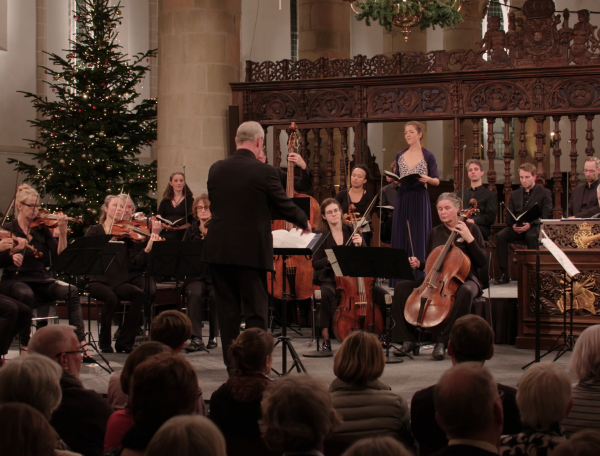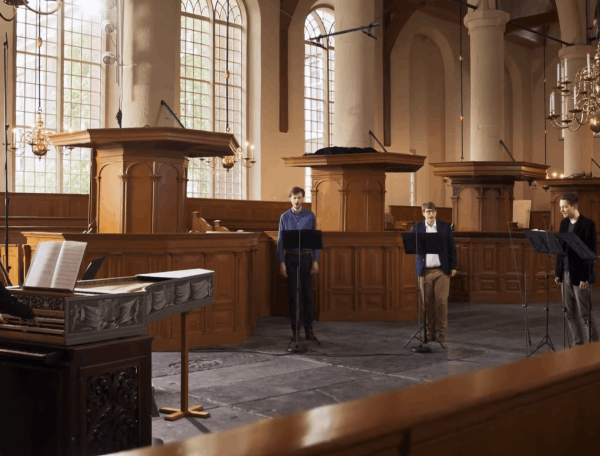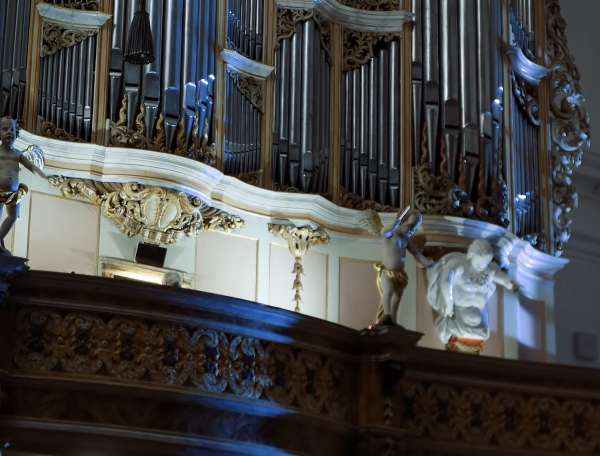
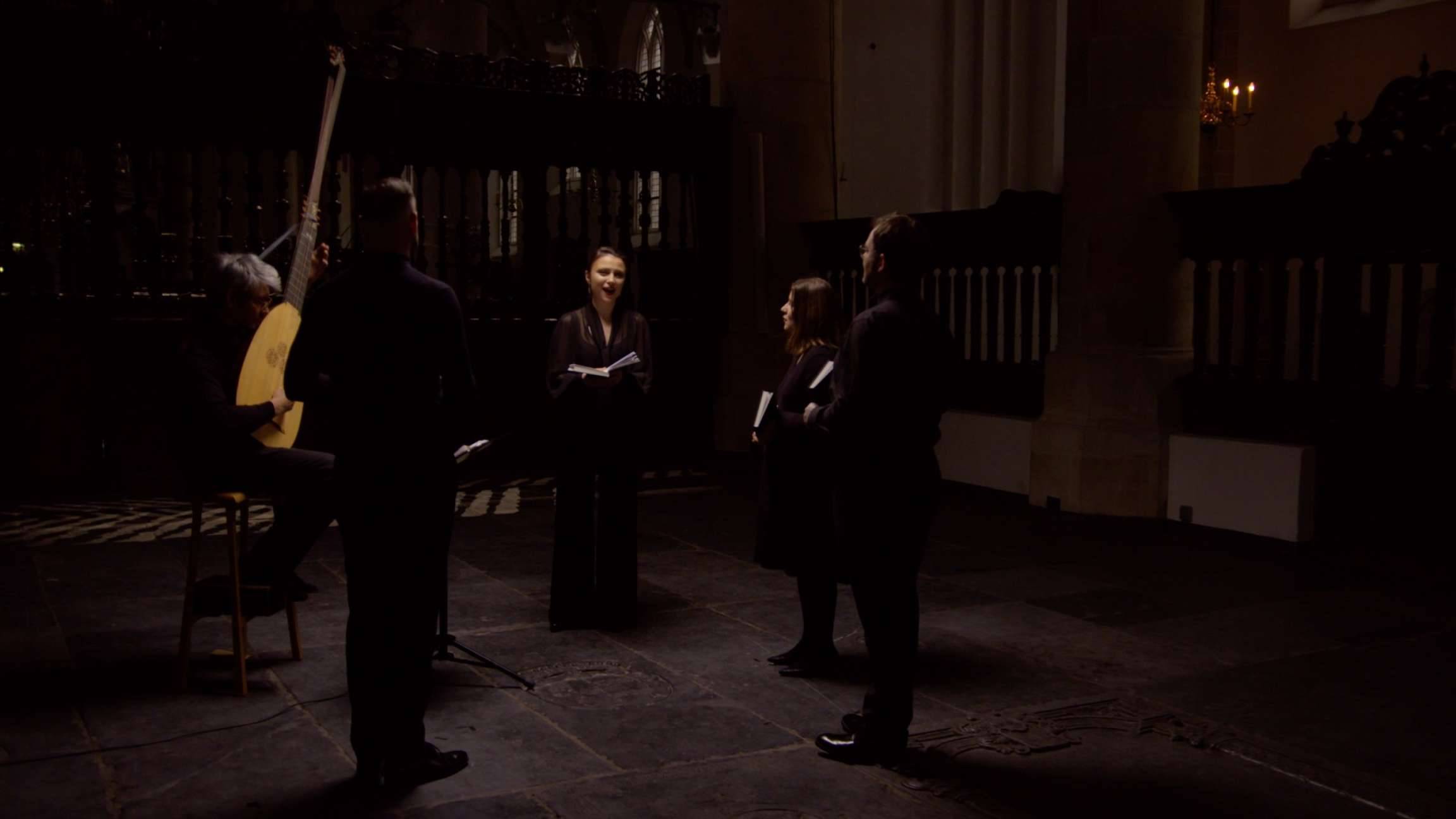
Wie schön leuchtet der Morgenstern
BWV 436 performed by the Netherlands Bach Society
Grote Kerk, Naarden
Behind the music
Full of imagery
Bach allowed Nicolai’s text to speak for itself
The text of this chorale is teeming with partly concealed imagery. The opening line gets straight to it, with a cosmic metaphor. In Europe, the planet Venus can be seen only in the early evening and in the morning just before dawn as a bright ‘star’ on the horizon. As the morning star, it thus heralds the light of day. Both Christ and Mary (and sometimes John the Baptist as well) were therefore compared to the morning star.
The chorale Wie schön leuchtet der Morgenstern was written by the poet and song composer Philipp Nicolai (1556-1608). He wrote both the seven-verse text and the melody, which he published in 1599. The poem is a kind of acrostic. The first letters of each strophe (WEGUHZW) refer to Wilhelm Ernst Graf Und Herr Zu Waldeck, a noble pupil of Nicolai, who had died in 1598 at the age of fifteen.
The poetic form was also conceived by Nicolai himself. The unusual structure of the number of syllables in each line (8, 8, 7, 8, 8, 7, 2, 2, 4, 4, 4, 8) means that every strophe ends with a sort of rhetorical crescendo, from 2 to 4 to 8 syllables. Furthermore, if you centre the text, each strophe forms the shape of the chalice that held the blood of Christ.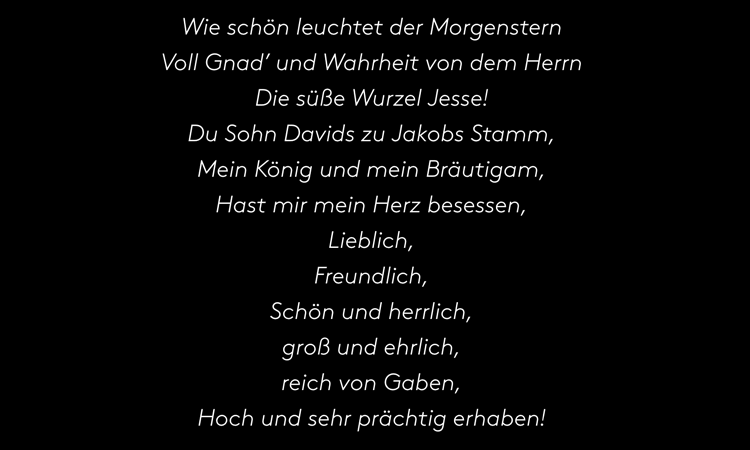
Bach decided not to add any more musical metaphors to the wealth of images already in the poem itself. This harmonious setting reserves the starring role for Nicolai himself.
- BWV
- 436
- Title
- Wie schön leuchtet der Morgenstern
- Genre
- chorales
- Lyricist
- Philipp Nicolai (1599)
Extra videos
Vocal texts
Original
Wie schön leuchtet der Morgenstern
voll Gnad und Wahrheit von dem Herrn,
du süße Wurzel Jesse.
Du Sohn Davids aus Jakobs Stamm,
mein König und mein Bräutigam,
hast mir mein Herz besessen;
lieblich, freundlich,
schön und herrlich,
groß und ehrlich,
reich an Gaben,
hoch und sehr prächtig erhaben.
Zwingt die Saiten in Cythara,
und lasst die süße Musica
ganz freudenreich erschallen.
Dass ich möge mit Jesulein,
dem wunderschönen Bräut’gam mein,
in steter Liebe wallen.
Singet, springet,
jubilieret,triumphieret,
dankt dem Herren,
groẞ ist der König der Ehren.
Translation
O Morning Star, in beauty bright
Ablaze with God’s grace, truth, and light,
The promised root of Jesse.
You, David’s son from Jacob’s tribe
My king and bridegroom; as a bride,
Take my heart in possession.
Loving, caring,
Lord of wonders,
great and honored,
Rich and generous,
Beautifully sublime and reverenced.
Then touch the chords of harp and lute,
Let no sweet music now be mute,
But joyously resounding.
Tell of the marriage feast, the Bride,
The heavenly Bridegroom at her side,
Mid love and joy abounding.
Shout for triumph,
Loudly singing, praises bringing,
Fall before him.
King of kings, let all adore him!
translation Stanza 1 © Ruth van Baak Griffioen (2021); Stanza 6 © Catherine Winkworth (1869, modernized)
Credits
-
- Release date
- 7 December 2023
-
- Recording date
- 7 March 2020
-
- Location
- Grote Kerk, Naarden
-
- Soprano
- Marta Paklar
-
- Alto
- Sofia Gvirts
-
- Tenor
- João Moreira
-
- Bass
- Matthew Baker
-
- Theorbo
- Mike Fentross
-
- Director
- Onno van Ameijde
-
- Music recording
- Guido Tichelman, Bastiaan Kuijt, Pim van der Lee
-
- Music edit and mix
- Guido Tichelman
-
- Camera
- Jesper Blok
-
- Lights
- Zen Bloot, Patrick Galvin
-
- Set technique
- Justin Mutsaers
-
- Projectmanager team
- Ron Vermeulen
-
- Video editing
- Bas Wielenga
-
- Assistent music recording
- Marloes Biermans
-
- Producer
- Jessie Verbrugh
Discover
Help us to complete All of Bach
There are still many recordings to be made before the whole of Bach’s oeuvre is online. And we can’t complete the task without the financial support of our patrons. Please help us to complete the musical heritage of Bach, by supporting us with a donation!
